- Home
- Mark Chadbourn
World's End Page 28
World's End Read online
Page 28
“I know you’re going to kill me,” he gasped, “so there’s no point me telling you anything.”
“It will be many days before we kill you, and plenty of roads of pain to explore before then.” Calatin leaned over until Church could smell the foul reek of his breath. “But this is the beginning and all roads lead from here. I will ask you again: where is the stone?”
Church closed his eyes, muttered a prayer, and then screamed and screamed.
Calatin’s voice floated to him through the waves of pain, fading in and out with the susurration of the tides.
“… citadels are hidden in the dark places beneath the earth. We are scattered to the four winds. No point on this island is free from us. And we wait and we wait, for we have waited for so long, until the stars are aligned, the seasons are ready, until the gates fall open forever and we can see to eternity. The end…”
Fading in and fading out. Calatin standing nearby, talking as if to himself, his eyes fixed firmly on some inner horizon, painting a picture of future terror.
“… your land will be transformed. The eternal night will be drawn across the fields and hills, the moors and rivers, and not even the brightest light will pierce the gloom. Blood will flow through the streets of your cities like rivers and we will have fresh meat on our plates at every meal. Madness will strike you down when you look upon the face of the returned ones and know no prayer will deter them, no god will be listening. Your voice will have no authority in the face of powers you thought impossible. Your people will be herded, screaming, desperate, alone …”
Darkness and pain. Hiding in the hole of his head, digging down deep until he could find that spot where the hero lay sleeping, waiting to be wakened to defend the island once more. But the road to the cave was long and filled with unquiet spirits. Marianne was there, repeatedly. She blew him a kiss as she jumped off the tube on her way to her interview in Wardour Street. She paddled in the warm waters of Ganavan, splashing him with her feet before they rushed to the dunes to make love. And she stood on the deck of a boat as the rising sun painted the Thames red, offering a kiss that transformed his life. Then she was speaking the words of the young Marianne, about life and death, the two of them merging into one. Here there was meaning and that gave him the strength to continue.
He awoke on the straw of the cell once more, his body afire with agony, his clothes soaked with blood.
“I thought you were dead,” Witch’s voice floated over him. He tried to speak, but the words were strangled in his throat. Rough hands grabbed his head and levered it up so he could take some stagnant water on his tongue from a wooden bowl. Witch’s face fell in and out of focus, concerned, yet also filled with the fear of his own memories. “You look like shit. And I thought I had it bad when that bastard got me in his little playpen.” He heaped some straw with one hand, then lowered Church’s head gently on to it. “If it’s any consolation, I don’t think you told them anything. He was in a foul mood when they threw you in here. You’re a better man than me. I’d have given up my nan if they’d asked me.”
Church closed his eyes and felt a wave of relief settle through him like mist. He feared he might have said something and forgotten it in his pain-induced delirium, but he had come through. Ironically, the suffering had driven him so far inside himself he had found what he had been looking for all along: the sleeping hero. And now he did feel different: stronger, more confident, less concerned by the petty fears and mundane terrors which had been undermining him for so long. Not even the thought of more torture could bring him down. He felt reborn.
“We find strength in hardship,” he croaked deliriously. Veitch saw the smile on his face and asked him if he were going mad from the pain, but Church was already drifting off into a recuperative sleep.
He didn’t know how long he had been out, but he felt much better when the sound of the door disturbed him. He managed to lever himself on to his side to see two shadowy forms dragging what appeared to be a shapeless sack before throwing it into the other cell. When they had left he watched it closer. After a while it moved, then groaned.
“Are you okay?” His voice still sounded tissue-paper thin.
There was silence for a minute, and then the new arrival pulled himself weakly across the floor and used the bars to haul himself into a half-sitting, halfleaning position. In the flickering torchlight, Church saw an old man, his face haggard from suffering, his grey hair dirty and matted. He looked about a hundred. But then, gradually, Church saw through the mask crafted by pain and a wave of horror swept over him.
“Tom?” he hissed. Nearby, Veitch stirred and looked up.
The man looked across at Church, his piercing grey eyes now dull and flat. “I never thought they would do it.” His voice was frailer than Church’s, rustling on the edge of hearing, so weak it seemed he was only a step away from death. “The old ways do not matter to them any more. They are so sure of their power, of victory, they feel able to ignore everything that has been established. I never thought ..
Veitch knelt down next to Church. “Who’s that?”
Church explained briefly, then said to Tom, “Did Calatin do this to you?”
“He wanted to know if the others still had the power without you.” Tom’s Scottish brogue was stronger in his weakness. He sucked in a deep, juddering breath and seemed to find a little strength from somewhere. “They don’t want to divert their attention from whatever it is they are doing, but they know you are all a threat.”
“What are they doing?”
Tom shook his head. “Waiting. Making preparations.”
“Can the others stop them without me?” He glanced at Veitch. “And Ryan?”
Tom seemed to see Church’s cellmate for the first time. “I don’t know. I know some things, enough to help, but not everything. The legends of the Brothers and Sisters of Dragons have always talked about them as a unit, greater than the sum of its parts. The power you represent is heightened and focused when you are all brought together. Individually, you have some particular strengths, but-“
“Not enough,” Church finished bleakly.
Somewhere far off through the rock the tolling bell started once again, striking its long dismal notes that seemed to mark the end of them all.
The blast in Salisbury had left Tom weak and disoriented. As he staggered around attempting to find Ruth, the few remaining creatures had attacked him mercilessly. And when he came around, he was in the dark and in the hands of Calatin. The tortures inflicted on him had been intense. It seemed the Night Walkers’ plan was in effect, but many elements were finely balanced and the timing was crucial; they could not afford any disruption. Although their infiltration of society was overwhelming, it appeared they feared Church and the others intensely; or rather, feared what Church and the others could do if they were allowed to reach their potential.
“But did you find out anything we could use?” Church said hopelessly.
“I do not know. It is so hard to remember.” Tom seemed disoriented, older than his years. Tenderly he touched the side of his head, where Church could make out the dark smear of encrusted blood.
“Are you okay?” Church enquired; it seemed a serious wound. Tom didn’t seem to want to talk about it so Church pressed him again for information. “At Stonehenge it was obvious you knew more than you were saying. You’ve got to tell me everything, Tom.”
“Sometimes there’s so much in my head,” he said deliriously. “All those years of thoughts piling up …” Suddenly he seemed to lock on to a random memory. “Do you want to know how it started?”
“Yes, I’d like that.”
“No, not how it really started. No one knows that. But how it started here. I can tell you that.”
“Go on.”
Tom shifted awkwardly until he found himself a relatively comfortable position. “You’re an educated man. You know about the Celtic myth cycle?”
“A little. Some reading at university-“
“That�
��s where it began. The secret history, locked in a few stories and passed down the years so mankind would never forget the suffering and the terror.”
Church struggled to remember, but it had seemed such an insignificant part of his studies that the details had not remained. “There was the Tuatha De Danann,” he began hesitantly.
“The name the Celts gave to them. The people of the Goddess liana, the last generation of gods to rule before mankind’s ascendence. When they arrived in our world, they brought with them great knowledge and magic from four marvellous cities-Falias, Gorias, Finias and Murias-as well as four talismans: the Stone of Fal, which screamed aloud when touched by the rightful king; the Sword of Nuada, their High King, which inflicted only fatal blows; the Spear of Lugh, the sun god; and above all else, the Cauldron of Dagda, the Allfather of the gods, source of life and death and healing.”
“Yes! Those are the things we’re searching for-“
“People have always been searching for them. No one ever finds them.”
“But we have to. To free the … the Golden Ones.” He told Tom about the woman in the Watchtower.
Tom snorted. “She is of the Danann. Of course she wants her people freed. But to find the talismans … They are more than they appear to be to human eyes, powerful symbols that …” His voice trailed off. “Listen to me. These gods and everything they deal with are so alien they are unknowable. Their appearances, their motivations … the best our minds can do is give them some shape that’s recognisable to us. Some are closer to us, like the woman you encountered between the worlds. Some are so incomprehensible we cannot even begin to give them form.”
“The creatures here-?”
Tom nodded. “Too terrible for your mind to bear, but it can be taught to give them shape. The Celts called them the Fomorii. Misshapen, violent, they were supposed to have come from the waters to invade this world. They were, to all intents and purposes, the manifestation of evil, a corruption, perhaps, or an infestation. The embodiment of negativity, constantly striving to drag the cosmos into chaos and darkness. And they were led by the most devastating, destructive force of all-the Celts called him Balor, the one-eyed god of death. The legends claimed he was so dreadful that whoever he turned his eye upon was destroyed.”
Tom’s description was so desolate Church felt a blanket of hopelessness descend on him. He couldn’t tell if Veitch felt it too; his head was lowered, his expression hidden by his hair.
“The Fomorii came like a tidal wave,” Tom continued. “The Tuatha D6 Danann were unprepared. They were enslaved and the Fomorii established a reign of terror that became known as the Eternal Night.”
“But the Danann struck back.” Church recalled the woman in the Watchtower’s account. “They had the power to defeat the Fomorii.”
Tom nodded. “The war leader Nuada led the Danann in a counterstrike, but he seemed doomed to defeat until he was joined by Lugh, the sun god, who was part Fomorii. In the stories, his grandfather was Balor. At the second battle of Magh Tuireadh, Lugh plunged his spear into Balor’s eye, killing him instantly. The Fomorii were demoralised; the Danann easily regained power. But there had been too much destruction and suffering-even for gods-for things to return to the way they had been before. To preserve some kind of order, a truce was reached-the Covenant. Both the Danann and the Fomorii would leave earth to man and return forever to the Danann homeland which the Celts called Otherworld. And they took with them almost every magical creature, everything which couldn’t abide by the strict laws that would remain in their passing. That exodus was known as the Sundering and it was the end of the Age of Wonders, known also as the Age of Terror.”
“You’re just talking about bleedin’ stories!” Veitch said with exasperation.
Tom closed his eyes and laid his head back wearily. “The stories can only begin to hint at the truths of those days-they are coded messages from the distant past. There have been other legends in other cultures attempting to make sense of what happened, but the Celts came the closest in their descriptions, which is why they have been the most enduring. The stories are confused-the gods were given different names by the different Celtic tribes across Europebut in essence they were all talking about the same thing.”
“So they left us behind for good-“
“Not wholly. The boundaries between Otherworld and here were supposed to be sealed, but there were weak spots, the mounds, the lakes and rivers-the liminal zones.” Tom’s voice continually faded away, then grew stronger, so Church had to strain to hear what he was saying. “Some of the gods crossed back over for brief excursions or exerted their influence from Otherworld. Some of the magical creatures too. And sometimes people from here found their way over there.”
“I remember now,” Church interjected. “The Celtic gods slowly metamorphosed into our faery myths and Otherworld became Faeryland. The keepers of treasure and secrets, mischiefmakers-“
“Mischief?” Church was taken aback by the venom in Tom’s voice. “They interfered with us down the years, tormenting people, tricking people. Yes, sometimes it was just lights in the sky, strange sightings of lake monsters, nocturnal manifestations. And sometimes it was slaughter.”
“That’s all very interesting,” Veitch said sarcastically, “but it doesn’t exactly help us, does it?”
“Any information helps you,” Tom replied.
“It tells us the Danann have defeated the Fomorii before and they can do it again,” Church said. “It tells us there’s hope.”
“It doesn’t tell us how to get out of this bleedin’ cage!”
“You could have mentioned all this before,” Church said sharply.
“I could have.”
“How do you know all this? Did the Bone Inspector tell you?”
“Some of it.” There was a long silence in which he seemed to be wrestling with his thoughts, and then he said, “I have been to Otherworld.”
Church at first wondered if it were some kind of stupid attempt at humour, but he had never heard Tom joke before. “You’re lying.”
He sighed. “I never lie.”
“Then how?”
“Through one of those weak spots I mentioned. In Scotland, on a hillside.”
Witch seemed excited by this turn in the conversation. He crawled to the front of the cage and gripped the bars. “What was it like?”
“So many wonders.” Tom’s voice was oddly strained. “I was changed, immeasurably. I learned things there, wisdom, certain skills, the ability to manipulate subtle energies-“
“Magic,” Church said.
“If you like. Though I’m not adept, I achieve some little things.”
“Like getting us out of here?” Veitch said hopefully.
Tom shook his head and they all fell silent for a long minute.
“You’re not lying to us?” Church stressed.
“I said, I never lie.”
Veitch hammered a fist against the bars angrily, then crawled back to the corner of the cage.
“Then you know at first hand what all these so-called gods can do,” Church continued. “Is there hope?”
“There’s always hope.”
“What about Calatin and the Fomorii?”
“The Fomorii are a race made up of tribes, some large, some small, all vying for power. Since Balor died they have been on the verge of civil war. Although Calatin is the nominal leader, his halfbreed status has not endeared him to the others. But that’s by the by. Their return to our world has reunited them to a degree, but the power struggle has simply moved into the background.” He coughed fitfully, then spat through the bars. “You and the others are a fine trophy, the symbol of everything the Fomorii wish to eradicate. Whomsoever holds you captive, or eliminates you, is advanced in the eyes of all the tribes.”
“What are you saying?” Church gripped the bars to lever himself up; although the pain had receded a little, he felt like nails were being driven into his flesh.
“Were you to escape,” Tom con
tinued weakly, “there would be others at your back apart from Calatin. He is dangerous …” He paused, moistened his lips. “But there is one much worse. He controls dark power to a degree which Calatin can only dream of, but it has consumed him physically. Now his presence can only be contained by a murder of crows, swirling tightly together in a proscribed pattern that prevents his life energy seeping out. His name is Mollecht.”
Church remembered the description the Bone Inspector had given of their pursuers at Avebury. “So Calatin set the Fabulous Beast and the Wild Hunt after us, but this Mollecht is hunting us too?”
“Christ, it sounds like we’re wasting our time,” Veitch groaned.
“No,” Church said adamantly. “If we can get out of here and find the four talismans by Beltane then we can free the Danann-“
“Beltane?” Veitch looked at Church in bafflement.
“May Day.”
“Shit.” He slumped down in the straw, his head in his hands.
11 -and they can do all the dirty work for us,” Church finished, ignoring Veitch’s despondency.
“Best be careful what you wish for,” Tom croaked. His head was nodding; he was on the verge of either sleeping or blacking out.
“Tom!” Church called. “Stay focused. We need some answers. You’ve been out of this cell a lot. Did you see any chance of a way out of here?”
There was a long pause, then: “No. No way out.”
Occasionally noises would filter through the walls, their source impossible to discern, but disturbing nonetheless; Church tried his best to ignore them. Instead, he turned his thoughts to Tom and his outrageous assertion that he had visited the home of the gods. Church had noticed a single expression that had convinced him; it was so fleeting, it had probably only been there for an instant, but it had been so stark and filled with terror Church had almost flinched.
He and Veitch spent what seemed like hours turning over every possibility that might lead to escape, but their talk only increased their sense of hopelessness. Yet as they crawled off to their separate corners to sleep, Church’s mind was still turning, refusing to give up. Whatever had been released from deep within during his agonies on the torture table still fired him, refusing to allow him to drift into despair.

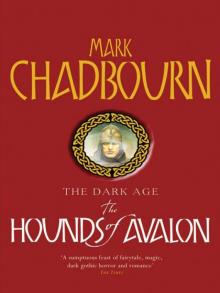 The Hounds of Avalon tda-3
The Hounds of Avalon tda-3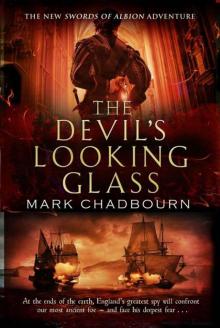 The Devil's Looking-Glass soa-3
The Devil's Looking-Glass soa-3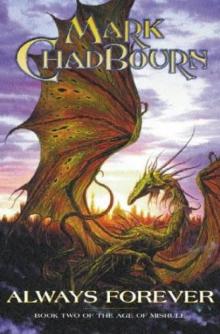 Always Forever taom-3
Always Forever taom-3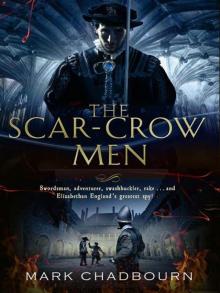 The Scar-Crow Men
The Scar-Crow Men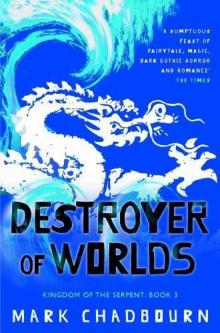 Destroyer of Worlds kots-3
Destroyer of Worlds kots-3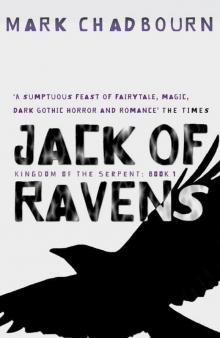 Jack of Ravens kots-1
Jack of Ravens kots-1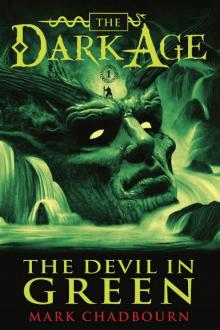 The Devil in Green
The Devil in Green World's End
World's End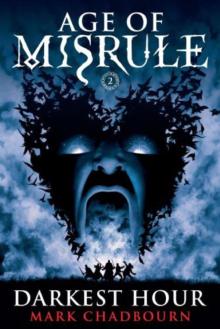 Darkest Hour (Age of Misrule, Book 2)
Darkest Hour (Age of Misrule, Book 2) Destroyer of Worlds
Destroyer of Worlds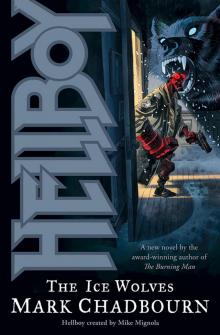 The Ice Wolves
The Ice Wolves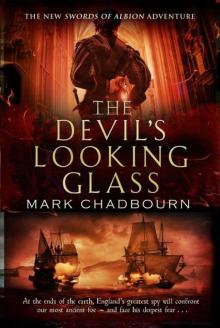 The Devil soa-3
The Devil soa-3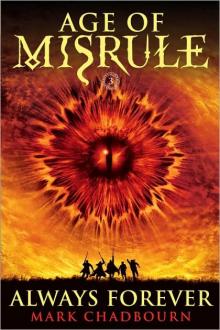 Always Forever
Always Forever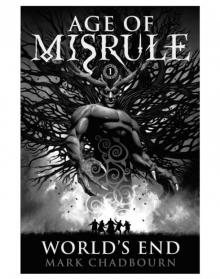 World's End (Age of Misrule, Book 1)
World's End (Age of Misrule, Book 1)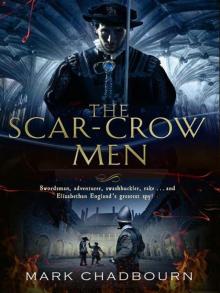 The Scar-Crow Men soa-2
The Scar-Crow Men soa-2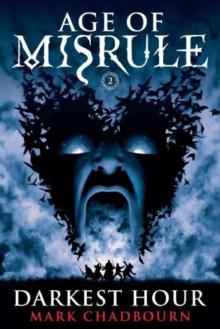 Darkest hour aom-2
Darkest hour aom-2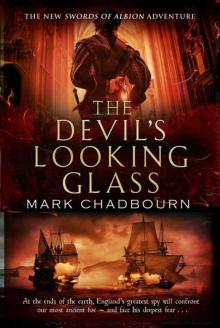 The Devil's Looking-Glass
The Devil's Looking-Glass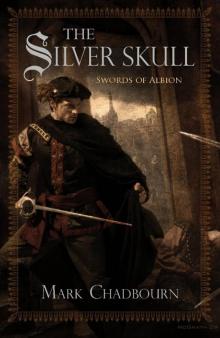 The Silver Skull
The Silver Skull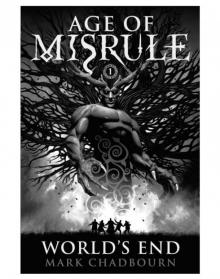 World's end taom-1
World's end taom-1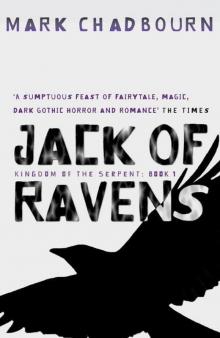 Jack of Ravens
Jack of Ravens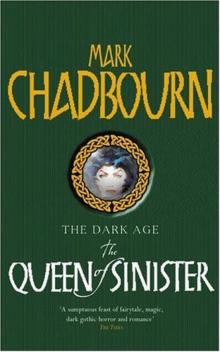 The Queen of Sinister
The Queen of Sinister